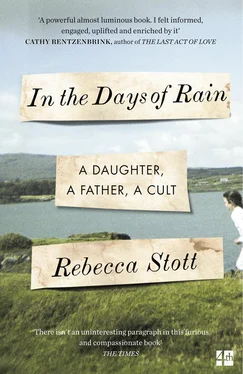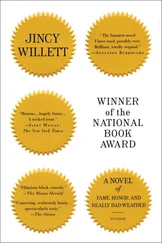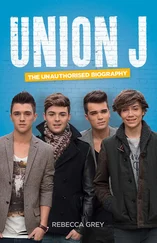And then the girl in the red cardigan and headscarf is in the room with me again. The girl I’d once been. She’s furious. She’s sitting in Meeting listening to the men preach, and she’s trying to figure out what ‘heavenly citizenship’ is, or what it means for a house to be ‘hallowed’, or whether the Holy Spirit is male or female and how transparent it is. And she wants to know why the women aren’t allowed to speak. But she knows she can’t ask questions about that because she’s a girl and she’s not allowed to speak either. And she’s wondering why none of the women are standing up and shouting and stamping their feet like she wants to do, telling the men to stop talking all that nonsense.
My father might have died before he’d been able to face his questions, but I still had time. This was going to be my story as well as his. I might be afraid of those bullying men and their lawyers, but I’d face them down. Let them come and find me.
Kez agreed to be my research assistant for a few weeks that summer. She’d make an archive in a series of box files, label everything. While I began to piece a history together, Kez found a website.
‘They’ve renamed themselves the Plymouth Brethren Christian Church,’ she said, passing me her laptop.
‘You must have found the wrong Brethren,’ I told her. ‘Exclusive Brethren never go anywhere near the internet. Mobile phones and computers are all banned. Bruce Hales – that’s their current leader – once described the internet as “pipelines of filth”. They’d never have their own website.’
But Kez was right. This was the same Exclusive Brethren that three generations of my family and I had all been born into: same leaders, same values, same rules. There were, according to Wikipedia, 46,000 of them, living in fellowship across nineteen different countries, 16,000 in the UK. The leader, Bruce Hales, was the nephew of the man who’d been in charge when I was growing up. They’d turned it into a family dynasty and rebranded – expensively. They must have renamed themselves to throw off the bad publicity they’d been attracting for decades, I told Kez. But why would they have spent that much money? They’d never cared about public opinion before.
The website had photographs and videos of Brethren Rapid Response Teams – young people dressed in high-visibility jackets – setting up travelling kitchens to feed people who’d lost their homes in bushfires in Australia or in flooding in the UK, handing out brownies to baffled fire crews or bottles of water to commuters at King’s Cross station during a heatwave. There were photographs of choirs of Brethren girls in long skirts and headscarves singing hymns to old people in care homes. It made the hairs on the back of my neck stand up.
Family is at the heart of everything we believe and everything we do , one caption read, printed over a close-up photograph of a small girl running her hand through ears of corn. I felt a sudden flare of fury. How dare they? I thought of the suicides; the thousands of families that the Brethren had tortured and broken up over the decades; the scores of ex-Brethren I knew who would never see their parents or their siblings again. Did the members of the PR company have any idea about the group they’d agreed to promote?
But when Kez and I looked at news archives, we found that the Brethren were still getting bad press. In 2009 an Australian investigative journalist had published a best-selling book about Brethren tax-avoidance schemes. He’d exposed their aggressive political lobbying in Australia; he’d interviewed hundreds of ex-Brethren about suicides, excommunications, severed families, and post-traumatic stress. 1The then Australian prime minister Kevin Rudd had described them as ‘an extremist cult that breaks up families and is bad for Australia’. 2
British investigative journalists had been on their backs too. Newspaper articles about Brethren faith schools and tax-avoidance schemes had dented their reputation. In 2012 Britain’s charity watchdog had denied charitable status to the Brethren for one of their trusts in Devon. They risked losing millions of pounds in tax breaks as a result. So they’d appealed against the decision, and started up that PR and lobbying campaign to get their charitable status reinstated. But, British journalists wrote, these were no little guys being picked on by the Charity Commission. These people preached hate.
‘We have to get a hatred, an utter hatred of the world,’ Hales had told a large Brethren audience in 2006. ‘Unless you’ve come to a hatred of the world you’re likely to be sucked in by it, and seduced by it.’3
British Brethren lobbyists had been more than usually aggressive in their campaign to get their charitable status reinstated. Two Times journalists had got hold of minutes from a meeting in which Hales had urged Brethren lobbyists to apply ‘extreme pressure’ to William Shawcross, the head of the Charity Commission; ‘Go for the jugular,’ he told them, ‘go for the underbelly.’ It made me shiver.
‘That’s in hand,’ one lobbyist had replied.4
For Hales and his followers, Shawcross was a non-Brethren ‘worldy’, an agent of Satan’s system and thus fair game.
When I read that the Charity Commission had renewed the Brethren’s charitable status in 2014 I began to wonder what they’d done to Shawcross’s jugular. Then I began to wonder what they might do to mine. I could see Kez was thinking the same thing.
‘Shit,’ she said. ‘This is scary.’
Over the next few weeks Kez labelled the box files ‘Before’, ‘During’ and ‘After’.
‘You can change it later,’ she said. ‘It’s just a way of dividing up the time for now.’
I nodded. The girl in the red cardigan was in the room again.
‘You might prefer “Aftermath”,’ Kez said, ‘rather than “After”. It gives more of a sense of consequence … You know – that what happens to you and your father after is a result of the screws gradually tightening in the “Before” and “During” parts.’
‘Of course,’ I said. I was remembering the feel of the headscarf knot pressing at the back of my neck and the weight of my uncut hair hanging down my back in braided ropes. ‘Yes. That’s good.’
I made a note to watch Wild Strawberries with Kez. She’s never seen any Bergman.
A month after we started, I dreamt Kez and I were lowering ourselves down into a dark network of caves on a long rope. She was ahead of me. She had the torch. She made me think of those old stories where an innocent girl has to slay a dragon to break a curse.
Her young handwriting layered over my father’s when she put his letters in order. ‘This one’s interesting,’ she’d write on a label on the plastic sleeve. ‘He was preaching out in the black townships during apartheid.’ On the letter that my father had written to my mother about divorce, Kez wrote: ‘This one might be hard to read.’
‘Break bread?’ Kez says. ‘What’s that?’ She’s secular. I’ve raised her that way.
‘Transubstantiation,’ I tell her. ‘Jesus died on the cross and left instructions that people were to remember his death, his sacrifice , by eating bread and drinking wine. The bread was supposed to be his body and the wine his blood. We called it breaking bread.’
‘I’ll look it up,’ she said.
I’m already back there, kneading the tiny piece of warm bread in my fingers in the early hours of the morning. It’s winter. It’s the first Meeting of the day and it’s still dark outside. I’m in my headscarf and my Best Dress and I’m holding my Bible in one hand and my doll in the other.
‘We called it breaking bread,’ I’d told Kez. Who, I wondered, was this we I kept slipping back into?
Читать дальше












